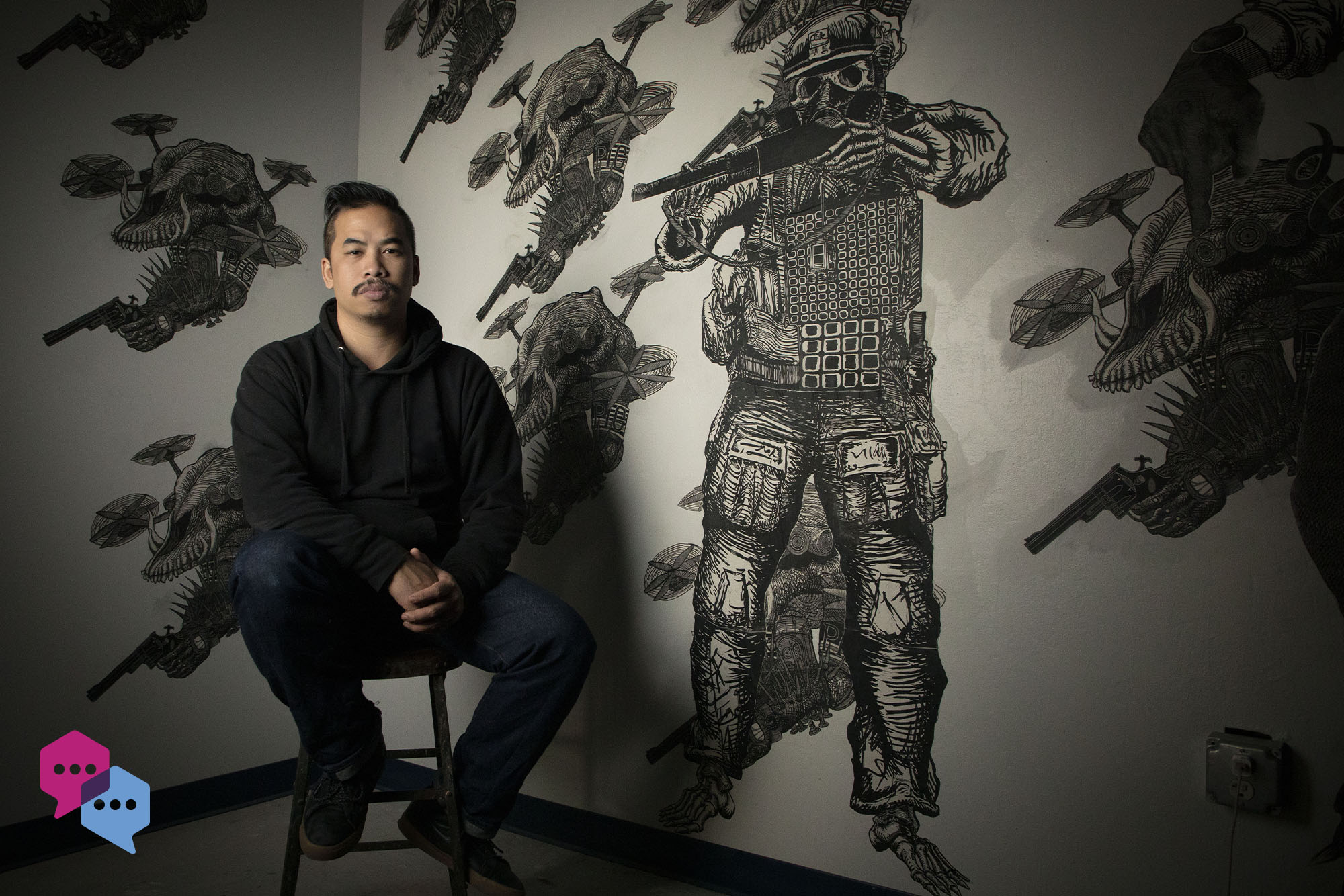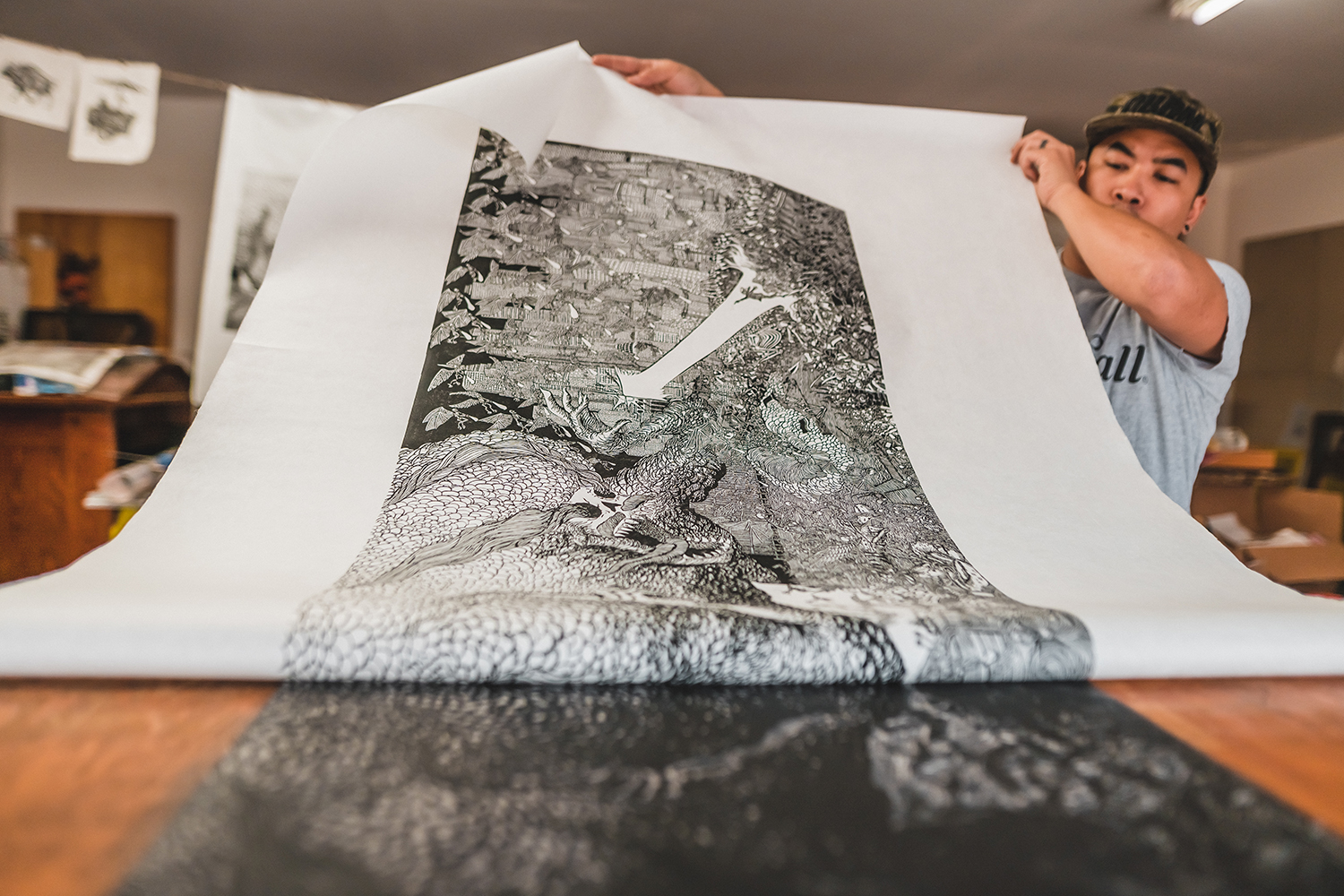Raj Bunnag
Raj Bunnag is a master’s student in the Department of Art & Art History in the UNC College of Arts & Sciences. He uses printmaking to shed light on historical and present-day racist violence and politics within the United States.
By UNC Research
March 23, 2022
Arts & Culture · Research Uncovered

Q: When you were a child, what was your response to this question: “What do you want to be when you grow up?”
A: For a long time, I just didn’t know what I wanted to be. I guess you could say I was always artistic, but it wasn’t until I was much older that I realized I could pursue it as a career or profession.
Q: Share the pivotal moment in your life that helped you choose your field of study.
A: It was 2006, and I was failing my way out of school. I wasn’t very passionate about anything until I took my first printmaking class. That class changed my life forever. Shortly after, I moved to my ancestral country of Thailand for a year, which put the journey my parents made to get to the U.S. and their sacrifices into perspective. When I moved back here, I began my journey to becoming a printmaker.
Throughout those years, I was struggling to find issues or topics that felt natural for me to talk about. It wasn’t until I circled back to the very subject that originally derailed my goals of becoming an artist in high school: drugs. My parents moved heaven and earth to enroll me at the predominantly white school to get me away from drugs — but, little did they know, doing so gave me access to all of them. This led to my interest in the history of the United States’ war on drugs. My print series, “March of the Druggernaughts: Fantastical Manifestations of the War on Drugs,” is about the failures, fallacies, and myths surrounding drug production, sales, and consumption.
Research for this series led me to where I am today, focusing on the bigger factors, such as policing and policies and the foundations of racism that the war on drugs is based on. It has led me to work on topics such as police reform, racial justice, and overall racial equality through acts of decolonizing spaces that were never meant for someone like me.

Q: Tell us about a time you encountered a tricky problem. How did you handle it and what did you learn from it?
A: My father taught me to be resourceful. You might not always have access to good or great things, so you have to make do with what you have. This has been something that I’ve carried with me in all the jobs I have had throughout my life. During the pandemic, this ability has allowed me to maintain my artistic practice and expand my reach. Having to work in an isolated environment, yet striving to share my work with others, has pushed me toward creating work that the public can engage in. This time has also made me realize that accessibility is something that is of the utmost importance for all of us.
While my father taught me to be resourceful, my mother taught me perseverance and empathy. Perseverance keeps me motivated to do this research and to educate others about the untold and often masked history of this nation I call home. Throughout my life, I have had apathetic teachers who didn’t know how to relate to me or to motivate me — and who ultimately failed me. But they showed me what not to do as an educator. Thinking about what others are going through and experiencing is an incredibly important skill to have as a teacher. Understanding students and others is incredibly important to community building and is something that I am constantly working on.
Q: Describe your research in 5 words.
A: Art addressing atrocious historical whitewashing.
Q: What are your passions outside of research?
A: Passions outside my field are necessary for my mental health. The content in which I dwell is the stuff of nightmares. The fact that it is all historically documented atrocities and inhumanity makes it all that much worse. So having points of brightness in all this gloom and doom helps. I love art history and history, making art more accessible to all people, reading, skateboarding, and video games.
Research UNCovered delves into the lives of UNC researchers from all disciplines and career levels, showcasing not only their research prowess but personal experiences in academia and beyond. Know someone we should feature? Nominate a researcher.
